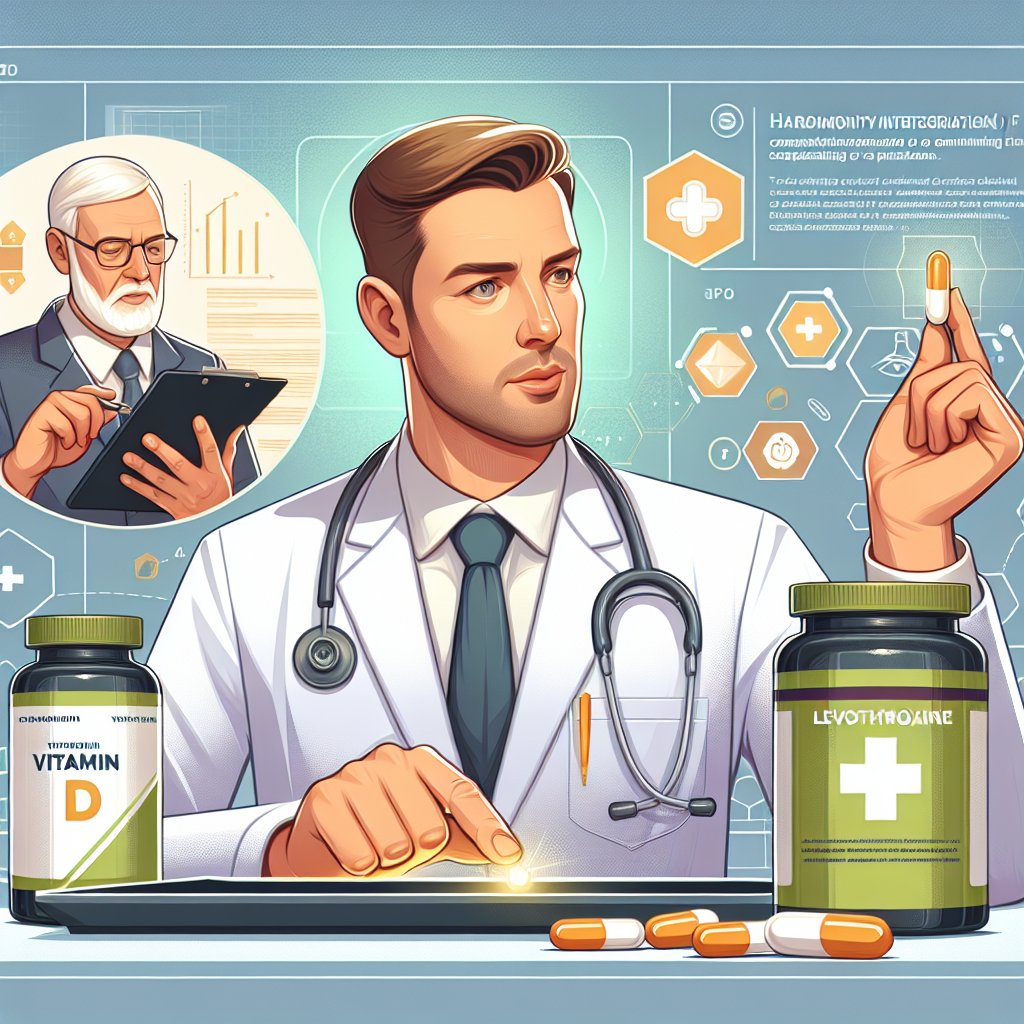Can I Take Vitamin D with Levothyroxine? Understanding the Importance, Interactions, and Guidelines for Optimal Health
Can I Take Vitamin D with Levothyroxine? Understanding the Importance, Interactions, and Guidelines for Optimal Health
Hey there, health-conscious readers! Today, we’re going to delve into the important world of vitamins and medication. Specifically, we’ll explore the relationship between Vitamin D and Levothyroxine and understand the importance, interactions, and guidelines for optimal health when taking them together.
Importance of Vitamin D and Levothyroxine in Maintaining Overall Health
Vitamin D is crucial for maintaining healthy bones, teeth, and muscles. It also plays a significant role in supporting the immune system, brain, and nervous system. Many studies have also linked Vitamin D deficiency to an increased risk of various chronic diseases.
On the other hand, Levothyroxine is a medication commonly prescribed to treat an underactive thyroid (hypothyroidism). The thyroid gland’s proper functioning is essential for maintaining and regulating metabolism, making Levothyroxine a vital medication for individuals with hypothyroidism.
When it comes to maintaining overall health, both Vitamin D and Levothyroxine are pivotal players. But what happens when they come together? Let’s find out!

Understanding Vitamin D and Levothyroxine
Before we delve into the topic of whether you can take Vitamin D with Levothyroxine, let’s first understand what these two elements are and their individual roles in the body.
What is Vitamin D?
Vitamin D is a crucial fat-soluble vitamin that plays a vital role in various bodily functions. It is well-known for its role in promoting calcium absorption, which is essential for maintaining healthy bones and teeth. Additionally, Vitamin D is involved in supporting immune function, regulating cell growth, and reducing inflammation. Research has also suggested that adequate levels of Vitamin D may help in preventing certain chronic diseases.
What is Levothyroxine?
Levothyroxine, on the other hand, is a synthetic form of the thyroid hormone thyroxine. The thyroid gland produces this hormone naturally and is responsible for regulating the body’s metabolism. Levothyroxine is commonly prescribed to treat hypothyroidism, a condition where the thyroid gland does not produce enough hormones.
Both Vitamin D and Levothyroxine play critical roles in maintaining overall health.
Interactions Between Vitamin D and Levothyroxine
When it comes to optimizing your health, it’s important to be mindful of potential interactions between different supplements and medications. This is especially true for individuals taking levothyroxine for thyroid health and considering adding vitamin D to their regimen. Research suggests that there may be an interaction between vitamin D and levothyroxine.
A study published in the American Journal of Medicine found that taking vitamin D supplements at the same time as levothyroxine may decrease the absorption of levothyroxine in the body. As a result, it’s recommended to take these two supplements at least four hours apart to avoid any potential interactions.
It’s essential to consult with a healthcare professional, such as your doctor or pharmacist, before making any changes to your supplement or medication routine. They can provide personalized guidance based on your specific health needs and ensure that you’re taking these supplements in a way that optimizes their effectiveness.

Research Studies and Findings
Several research studies have explored the relationship between taking Vitamin D with Levothyroxine and its impact on overall health. One study, published in the International Journal of Health Sciences, found that Vitamin D supplementation in patients with hypothyroidism (for which Levothyroxine is commonly prescribed) led to improved thyroid function and reduced the need for higher doses of Levothyroxine over time.
Another study in the Journal of Clinical Endocrinology & Metabolism indicated that Vitamin D deficiency is prevalent among patients with thyroid disorders, and supplementation may have a positive effect on thyroid autoimmunity. The study also suggested that there may be an association between low Vitamin D levels and the development of thyroid disorders.
Furthermore, a meta-analysis published in The Journal of Clinical Endocrinology & Metabolism revealed that Vitamin D supplementation was linked to a decrease in thyroid peroxidase antibody levels, which is significant in autoimmune thyroid conditions such as Hashimoto’s thyroiditis.
These findings highlight the potential benefits of taking Vitamin D with Levothyroxine, particularly for individuals with thyroid disorders and associated Vitamin D deficiency.
Guidelines for Taking Vitamin D and Levothyroxine Together
If you’re taking Levothyroxine for hypothyroidism, you might be wondering about the interaction with Vitamin D. Research shows that Vitamin D deficiency is common in individuals with hypothyroidism, and supplementing with Vitamin D can positively impact thyroid function. However, it’s crucial to consider the timing of consumption. To maximize benefits, it’s best to take Vitamin D supplements at least 4 hours apart from Levothyroxine. This allows for optimal absorption of both medications, minimizing any potential interference. Always consult with your healthcare provider for personalized recommendations.

Consulting Healthcare Provider
Before starting any new supplement regimen, especially if you’re on medication such as levothyroxine, it’s crucial to consult with your healthcare provider. This is particularly important when considering taking vitamin D alongside levothyroxine. Healthcare providers bring valuable expertise to the table and can assess your individual health needs, potential interactions, and optimal dosage.
Research has shown that vitamin D supplementation may affect the absorption of levothyroxine, which is why professional guidance is essential.
By consulting your healthcare provider, you can ensure that any decisions regarding your supplement intake are personalized to your unique health profile, helping you achieve optimal wellness while minimizing potential risks or interactions.
Remember, your healthcare provider is your partner in health, so be sure to discuss any questions or concerns openly with them, including the possibility of taking vitamin D with levothyroxine.
Conclusion
After delving into the topic of taking Vitamin D with Levothyroxine, it’s clear that informed decision-making is crucial for optimizing health and well-being. Understanding the potential interactions between these two supplements and how they affect thyroid function is essential for making the best choices for your body.
Remember, Vitamin D plays a vital role in supporting overall health, and for individuals with hypothyroidism taking Levothyroxine, ensuring adequate levels of Vitamin D is especially important. However, it’s equally important to be mindful of the timing and dosage of these supplements to avoid any interference with the absorption and effectiveness of Levothyroxine.
By consulting with your healthcare provider, monitoring your thyroid hormone levels, and staying informed about the latest guidelines, you can confidently navigate the question, “Can I take Vitamin D with Levothyroxine?” and make personalized choices that promote your optimal health.


